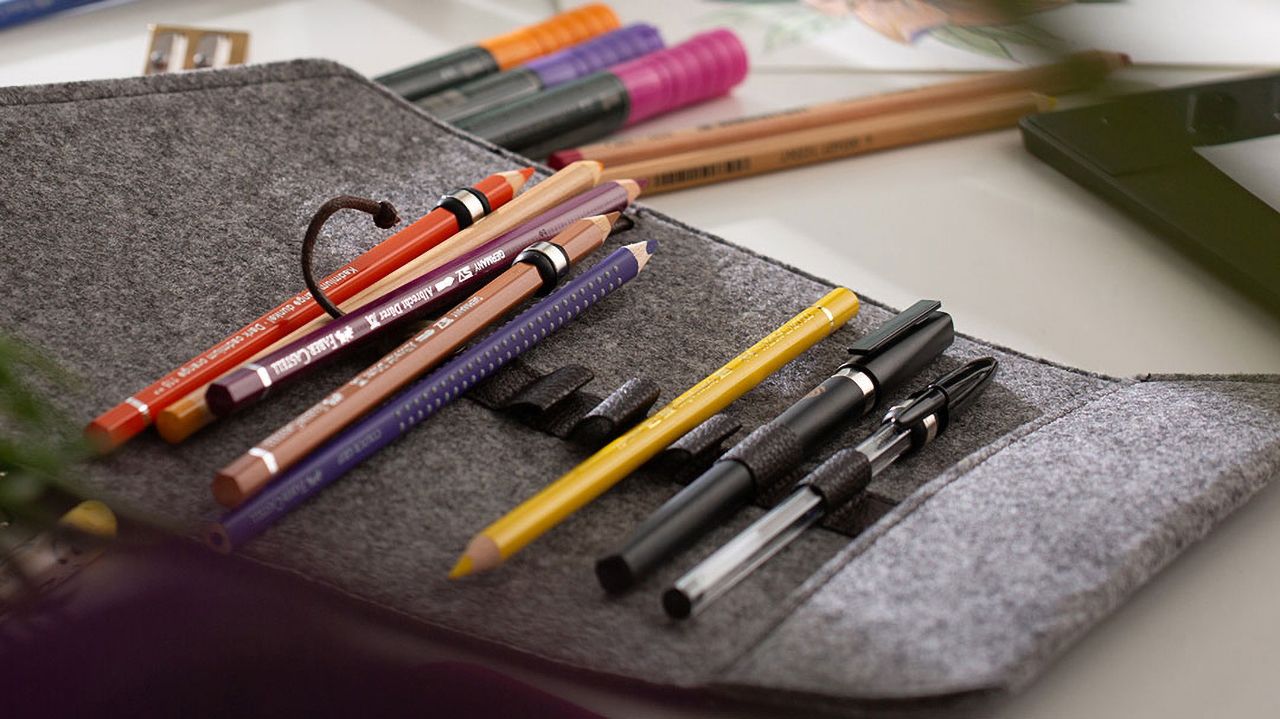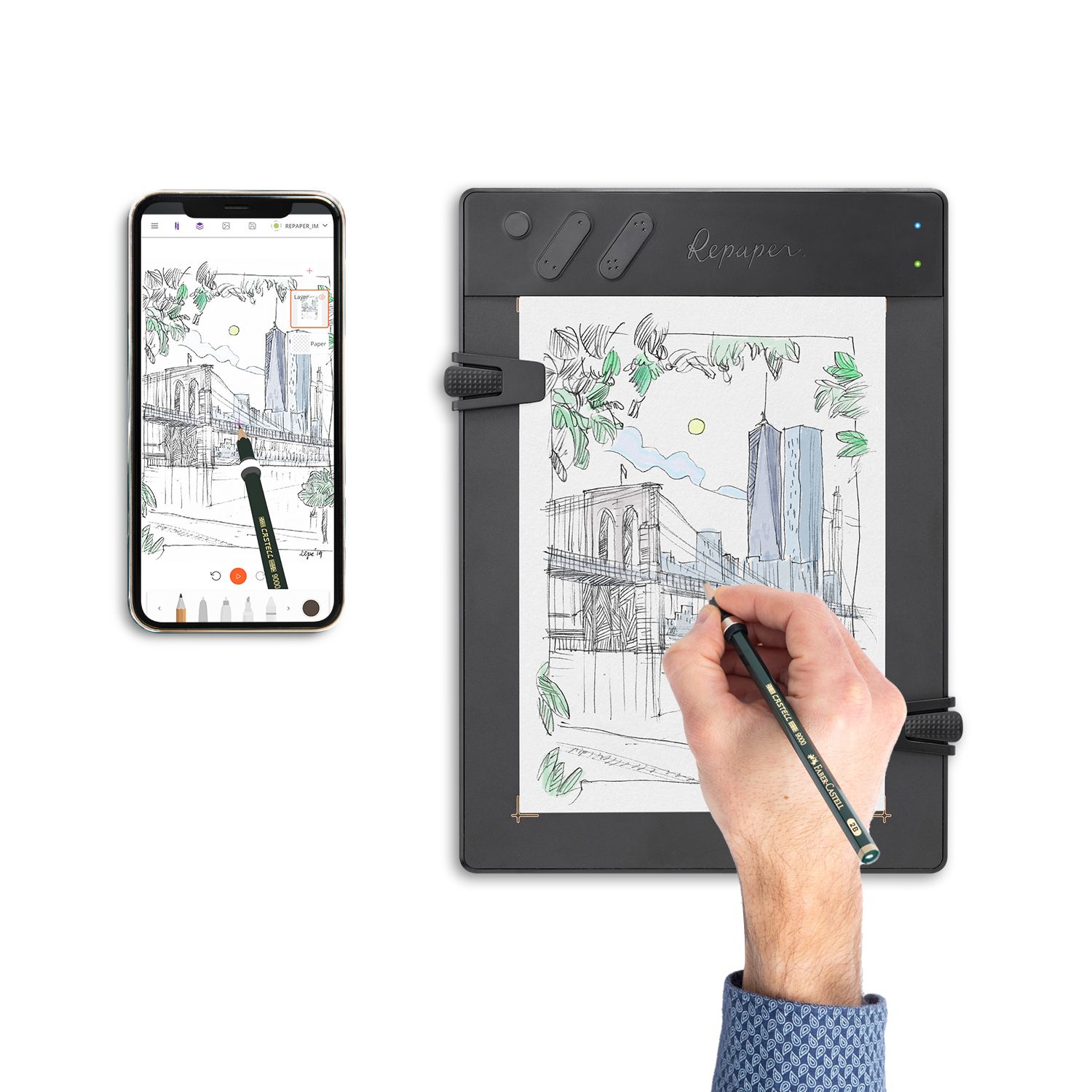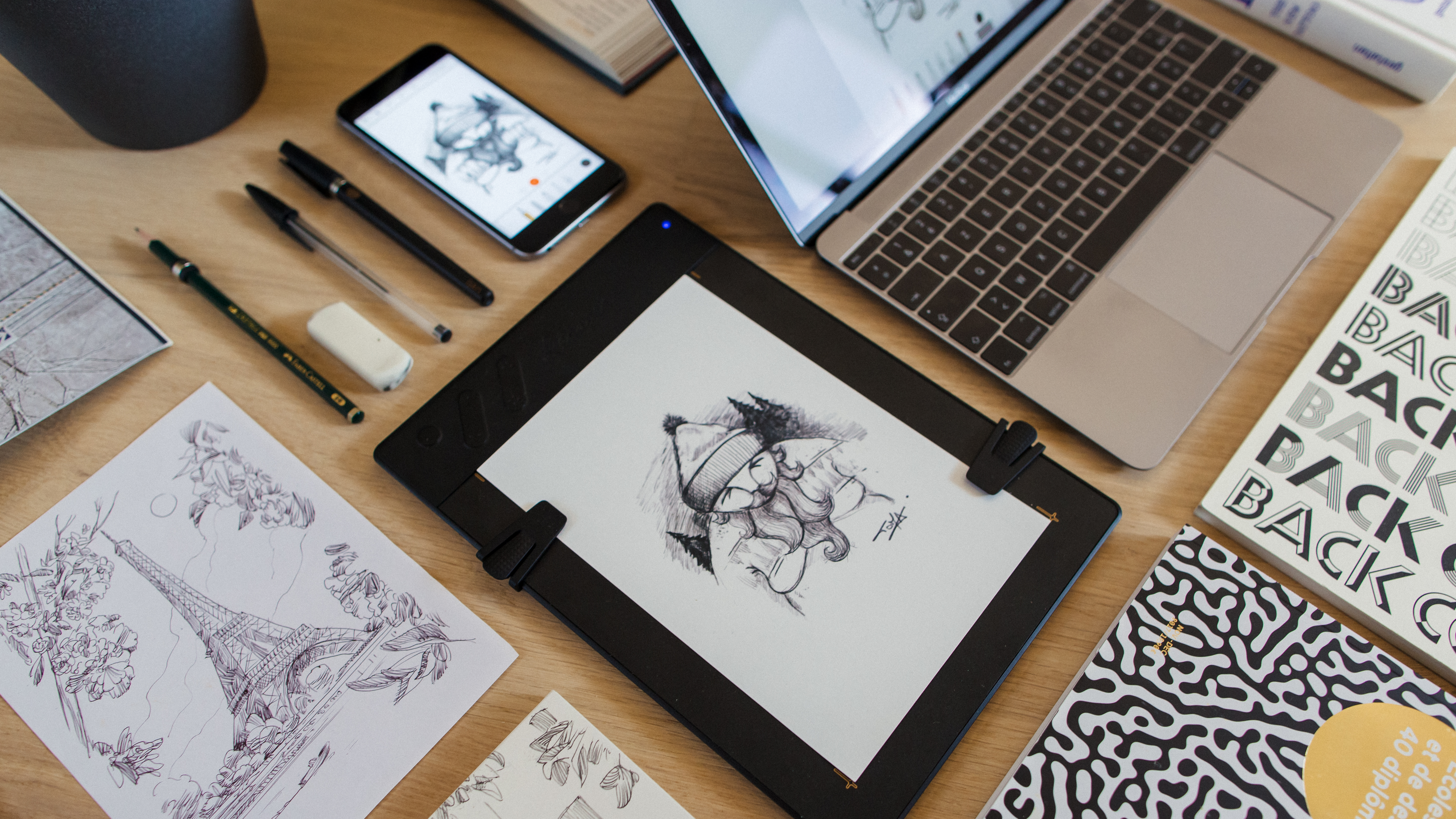
Which drawing material to use?
Drawing with a pencil on a sheet of paper, or on a drawing tablet, requires in all cases to invest in more or less abundant equipment. Which tools should I use? Which ones are the most essential to start drawing? How to choose among all the paper and pencil references? We give you some tips to help you find your way through all this gear.

Traditional or digital drawing equipment?
Traditional drawing equipment
When the beginner drawer wants to learn how to draw, and equip him or herself to make a sketch, the question arises as to what to use to be able to make a professional drawing, allowing him or her to implement different drawing techniques. Two main options are available to him/her to make his/her sketches: opt for a traditional equipment, mainly comprising paper and a pencil, and digital equipment, with a drawing tablet. Working with pencil, with specific drawing paper and graphite pencils, is the most natural for aspiring designers. Indeed, there is a great history of pencil drawings in the graphic arts, and anyone will intuitively know how to draw with these tools. All you have to do is put your pencil on your paper and let your imagination run wild. However, as soon as you want to obtain a different result, from other drawing techniques such as charcoal or pastel for example, it becomes mandatory to work differently. Moreover, with time, investing in a drawing board and other accessories becomes mandatory to produce works with more comfort and possibilities. All this material in the long term implies the purchase of many consumables, which wear out over time, and are sometimes fragile.

Digital drawing equipment
It is to avoid all the regular purchases of consumables in traditional drawing, and to try other specialties of drawing, that we can see creative people, beginners or not, opt for various drawing tablets. The latter have a definite advantage, they can work on drawing software such as Photoshop and Gimp, and make an artistic drawing, mixing styles, without having to invest in many different pencils and brushes. All you need is the touch surface of the graphics tablet, which acts as a drawing board and a sheet of paper, and a digital pen, which replaces any traditional tool. However, to draw with a drawing tablet without a screen (the most used to date), it requires a special learning process, as the hand-eye coordination is not as natural as with traditional equipment. Indeed, you have to look at your computer screen constantly in order to see what you are drawing. But new solutions are coming, and it is now possible, with a hybrid graphics tablet, like the Repaper by ISKN, to mix the comfort of drawing on paper, and the power of graphics software. This type of graphic tablet is the ideal compromise, as it allows you to attach a sheet of paper directly to the touch surface of the graphic tablet, and to work with your favorite pencil, by installing a magnetic ring that retranscribes to the device all the movements of the grey pencil, felt-tip pen or pen on which it is attached. It is thus possible to draw with the tools proposed by the graphic software, to have a particular rendering on the computer, while drawing normally on the paper fixed on the drawing tablet.

Essential drawing materials to get started
The graphic medium
When you want to start drawing, the medium on which you will make your sketches is very important. It is necessary to select it carefully, according to the type of drawing you want to make. Beginners will gladly opt for a sheet of graph paper at the beginning, but will soon have to turn to media more adapted to technical drawing, depending on their objectives. To put it simply, one could say that sheets of paper with a smooth surface are suitable for ink drawings, such as calligraphy with Indian ink, or for comics, which may need to be scanned without the effect of grain behind. Those with a rougher grain, such as Canson sheets, will be ideal for drawing with charcoal or pastel, techniques that require a fixation to the support, which a grain with a more imposing relief offers. The weight of the paper will also be important, and if a light weight will be usable for dry techniques such as graphite, it will be necessary to use a thicker weight, as you use wetter techniques, such as ink or paint. This is why we use thick canvases, with a large grain, to be able to fix the paint properly on its support. Standard pencils, like markers, or basic drawing tools, have the particularity of being able to adapt to the vast majority of papers. So it becomes a matter of preference, and the best thing to do is to go to a stationery store and try out several models of drawing sheets and notebooks. It is also possible to innovate, and why not use cardboard to make stencils to draw repetitive patterns, or use tracing paper, to draw for animation for example.
Graphite pencils
Drawing with a standard graphite pencil, more commonly known as a "gray pencil", "wood pencil", "paper pencil" or "lead pencil", depending on the region, makes it possible to do almost all possible sketches, in a simple, inexpensive way, with great ergonomics and comfort. It has the great advantage of being adaptable to almost any surface, of being erasable with an eraser, and of being able to offer a variety of models, from the small lead pencil of the criterium type with its unequalled finesse, to the thicker pencil such as the type B and its greasy lead which is more difficult to erase, passing by a pencil of the H type, with dry and easy to erase leads. The star of the pencil drawing world is still the HB pencil, the most famous one, because it is used by a large part of the population, from the little school children to the grandparents. The HB pencil strokes, offering immense versatility, make it possible to achieve all possible works with a simple sheet of paper and a pencil, from realistic drawing, to manga drawing, to comics, or giving the opportunity to draw a portrait with a pencil, among others. Any pencil drawing technique is possible, and it is as easy to draw fine lines, as shadows, or flat areas by blending the material with a stamp. It is the perfect drawing pencil for the beginner, because of the variety of uses it offers, and the possibility to erase it easily, but also because of its very affordable price. It will however require a quality sharpener to maintain it, and to keep using it for a maximum of time.

The eraser
The eraser, although not essential at the beginning, starting over is more advisable than going backwards by erasing when you start, is an element that quickly becomes essential when you progress and start to make more ambitious drawings. There are many different erasers, such as the breadcrumb eraser, which allows you to erase the lines of soft and fat pencils, without only blurring them, or the white eraser, which is more suitable for hard or medium pencils, whose lines are easily erased. Erasing efficiently depends on the hardness of the pencils used, and it is important to choose the right eraser, but above all not to use it excessively, in order to keep your drawing as clean as possible.
Particular pencils: charcoal, felt-tip pen, …
Once you are comfortable with the different types of graphite pencils, you can try your hand at other drawing techniques. You are free to equip yourself with the necessary material for drawing with charcoal, black stone, graphite or why not with a ballpoint pen. Having a panoply of pens, charcoals, various metal tips, felt-tips and black markers for inking, chalks to try new supports, or pastels, among others, will allow you to discover new horizons, and to indulge in brand new ways of drawing. Some of these items require a fixative to last over time, and you will also need to choose your paper carefully so that these tools can be used in the best conditions.
Colorization tools
To color your drawings, you can bring the necessary coloring materials for this. We know colored pencils, which, if used properly, can give a nice finish to your sketches. However, you should choose a large collection, with large gradations of colors, in order to make many realistic gradations in your sketch. Like the colored pencil, the felt pen comes in many shades of color, and having a variety of them can be interesting for finalizing and colorizing certain types of drawings. Some people will also appreciate the creative side of pastels, whose hue can be infinitely varied, or of brushes and different types of paints with a wide range of pigments. However, if you use white paper, you will certainly have no problem coloring your works easily, with a bright rendering, but on the contrary, the use of a paper of more or less dark color, can make the colors used dull, and it is then important to choose the adapted material so that the color of the pencils takes precedence over that of the sheet.

Digital tools
As we have already seen, digital tools make it possible to work on graphic software and to try out several techniques in a simple way and without the need for a wide range of tools. If, in theory, a simple drawing tablet without a screen and a digital pen can do the job, this type of device does not allow you to work intuitively, because of the hand-eye coordination, nor to be able to draw on the move, as you could do on a standard drawing pad, because of the need to have a computer available. The beginner in drawing can then turn to a hybrid tablet, like the Repaper from ISKN, which allows, as we have already seen, to work on paper, with a standard pencil, but also to draw anywhere, thanks to a built-in memory, which records the pencil strokes made on the paper, directly in the memory of your tablet. All that's left to do is to transfer your backups to your computer when you get home, rework your sketches in the graphics software of your choice, and practice using a standard drawing tablet by switching your tablet to screenless mode.
Conclusion
Today, digital technology provides unparalleled versatility with the options offered by graphics software, and investing in a simple drawing tablet can be a solution to avoid having to buy countless pencils. However, when you are a beginner, it is interesting to be able to learn drawing on paper, this method being more intuitive and natural. It is therefore necessary to equip oneself with the basic tools to be able to draw correctly, and bridging the gap with a hybrid drawing tablet can be a solution to not spend too much money in the profusion of material, to be able to indulge in other styles of drawing at a lower cost, to discover the world of digital, and to keep the comfort of learning the traditional drawing.


Discover more
How to find your drawing style?
Find your style to draw by following our tips and the accessories that will help you get there.
How to find inspiration in drawing?
Get creative again by discovering the tips that will help you find inspiration when you don't know what to draw.
How to become an interior designer?
Interior design can be a real option for creative people who enjoy rearranging rooms, modifying and reworking furniture and decorative elements.
Newsletter
Keep up to date with iskn news and events
Free standard delivery
for purchase over $80
30-day returns
on all products
Secure payment
with Stripe & PayPal
Pay in 4
with PayPal
Customer service
chat with us


